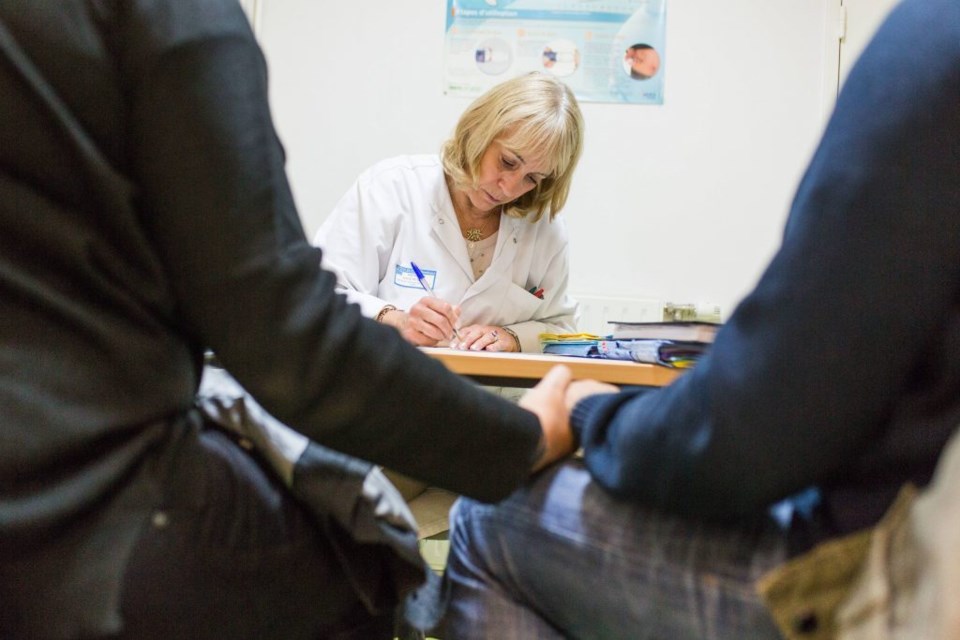Elena Mularcyzk’s daughter often asks her when she’ll have a baby brother or sister.
“Our daughter is constantly drawing pictures of babies in mommy’s tummy. She’s so excited about having a sibling,” the Oshawa, Ont., mother said.
But Mularcyzk isn’t pregnant. She and her husband were ready to try one last round of in vitro fertilization (IVF) this spring — but then the novel coronavirus pandemic hit Canada.
“Any fertility process is just about waiting and waiting … now we need to wait some more,” Mularcyzk told Global News.
Her daughter Isabella, now four, was conceived after three rounds of IVF. Mularcyzk underwent a fourth unsuccessful round of IVF in an attempt to conceive a second child in 2019.
Then, earlier this year, she was finally told there was another viable embryo ready for transfer — but the procedure was placed on hold as fertility clinics were forced to close due to the COVID-19 outbreak.
“We’ve been working at [giving Isabella a sibling] for a couple of years,” Mularcyzk said of her long struggle with fertility.
“We’ll do a fifth round … and if we get lucky, that’s great, but if it doesn’t happen, at least we have our daughter.”
Mularcyzk is just one of thousands of people across Canada whose family planning has been put on hold due to the deadly coronavirus outbreak.
On April 1, the Canadian Fertility and Andrology Society (CFAS) recommended suspension of “all diagnostic and elective procedures and surgeries,” and “postponing any new cycle starts” other than for fertility preservation purposes related to cancer treatment.
Elective procedures include egg retrievals, IVF cycles, embryo transfers, ultrasounds and all the things preparing for a transfer, said Dr. Michael Virro, fertility doctor at the Markham Fertility Centre and staff physician at Markham-Stouffville Hospital in Toronto.
“Anybody in the middle of a cycle … we [were allowed to] finish those up,” Virro said of the closures. “Anybody that was ready to get started, though — and there were quite a few of them — they did get cancelled.”
The unfortunate circumstances have left thousands of Canadian families in a lurch, and there’s no end in sight.
‘Losing precious time’
Fertility treatments are already emotionally-laden and stressful for couples, and the coronavirus crisis is only compounding those feelings.
“So many people seeking IVF are in their last few years of fertility. They’re losing precious time right now as they ride out the pandemic,” said Christine Korol, registered psychologist at the Vancouver Anxiety Centre.
“Procedures being delayed for 12 to 18 months might mean that some people just don’t get to have families.”
If you’re someone in this position, it’s totally normal to feel fear, sadness and grief.
“Fertility issues can cause an array of strong emotions towards oneself and one’s partner,” said registered psychotherapist Renee Raymond, of CaRib Counselling & Psychotherapy in Toronto.
“A woman may become anxious, depressed and feel highly stressed. It can also affect one’s feelings of self-worth and their self-concept related to being a woman.”
Pausing treatment can bring back those feelings of vulnerability people might feel about their inability to become parents, said Raymond.
“The loss of control and hope that may result from an interruption like COVID-19 can leave people reeling, unsure of what the future holds for them.”
It’s important that couples observe how they feel right now, seeking support from friends, family, doctors or therapists when needed, said Raymond.
This will help them stay “as grounded and healthy as possible” during these uncertain times.
While several of Virro’s patients were upset by the news, he was uplifted by the overall response.
“I think everybody gets it,” he said. “I’m getting the sense from our patients [that they know] we have to stay inside.”
“They’re saying: ‘We get it. We want to have our IVF done, but we also want to be safe and to get this virus under control.'”
Older patients
Delaying fertility treatment can be especially difficult for older patients, given that age is known to impact success.
Fertility decreases after age 35, according to Health Canada.
“Age really is our greatest nemesis as a fertility profession,” Virro said. “It just gets harder to make good embryos [and] there are more miscarriages.”
He worries about his older patients during this time, especially those in their 40s.
“Those are the ones that even three, four, five months [without treatment] will actually alter their chances quite significantly,” he said. “They’re the ones who are really struggling [with the hold].”
Mularcyzk is concerned about how long she may be asked to wait.
“Time is always a huge concern,” Mularcyzk said.
“The idea that I’m getting older … what does that mean for my chances?”
Questions about COVID-19? Here are some things you need to know:
Health officials caution against all international travel. Returning travellers are legally obligated to self-isolate for 14 days, beginning March 26, in case they develop symptoms and to prevent spreading the virus to others. Some provinces and territories have also implemented additional recommendations or enforcement measures to ensure those returning to the area self-isolate.
Symptoms can include fever, cough and difficulty breathing — very similar to a cold or flu. Some people can develop a more severe illness. People most at risk of this include older adults and people with severe chronic medical conditions like heart, lung or kidney disease. If you develop symptoms, contact public health authorities.
To prevent the virus from spreading, experts recommend frequent handwashing and coughing into your sleeve. They also recommend minimizing contact with others, staying home as much as possible and maintaining a distance of two metres from other people if you go out.
For full COVID-19 coverage from Global News, click here.
— With files from the Canadian Press & Global News’ Caryn Lieberman
Meghan.Collie@globalnews.ca
- Global News
